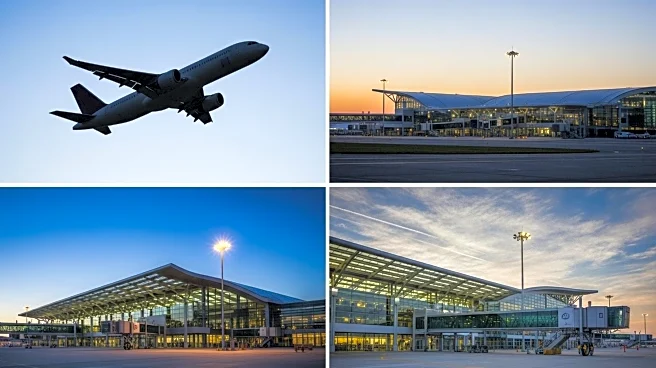What's Happening?
Doha Hamad International Airport and Beijing Daxing International Airport have entered into a sister airport agreement aimed at enhancing aviation cooperation between Qatar and China. The memorandum of understanding, signed on September 23, outlines plans for collaboration on passenger and cargo operations, technology, service design, and innovation. Hamad International COO Hamad Al Khater emphasized the strategic importance of this partnership in advancing Qatar's aviation diplomacy and strengthening ties with China. The agreement positions Doha as a key gateway for China to the Middle East, with Hamad International Airport already connecting to nine cities in Greater China. Beijing Daxing CEO Zhang Lin highlighted the potential for increased competitiveness and cultural exchange between the two hubs. The partnership will also facilitate expanded airline cooperation, with Qatar Airways and China Southern Airlines planning codeshare arrangements to enhance connectivity.
Why It's Important?
The sister airport agreement between Doha Hamad and Beijing Daxing is significant as it represents a strategic move to enhance global connectivity and strengthen economic ties between Qatar and China. By fostering collaboration in aviation operations and technology, the agreement is poised to improve passenger and freight logistics, potentially boosting trade and tourism between the regions. The codeshare arrangements between Qatar Airways and China Southern Airlines further expand travel options, benefiting passengers and airlines alike. This partnership underscores the growing importance of aviation diplomacy in international relations, with airports serving as critical nodes in global networks. The agreement may also set a precedent for similar collaborations, promoting innovation and efficiency in the aviation industry.
What's Next?
Following the agreement, Qatar Airways will begin codesharing on China Southern Airlines' flights between Beijing Daxing and Doha starting October 16. Additionally, China Southern will extend its code on Qatar Airways flights to various destinations across Africa, Europe, and the Middle East, pending regulatory approval. These developments are expected to enhance connectivity and offer more travel options for passengers. The collaboration may lead to further joint projects and initiatives aimed at improving airport operations and passenger experiences. Stakeholders in the aviation industry will likely monitor the outcomes of this partnership, which could influence future agreements and strategies in the sector.
Beyond the Headlines
The sister airport agreement between Doha Hamad and Beijing Daxing may have broader implications for international aviation standards and practices. By focusing on 'smart innovation' in operations, the partnership could drive advancements in airport technology and sustainability. This collaboration also highlights the role of airports in facilitating cultural exchange and economic growth, potentially influencing policy decisions related to aviation and trade. As airports increasingly become hubs for international diplomacy, similar agreements may emerge, fostering global cooperation and connectivity.









